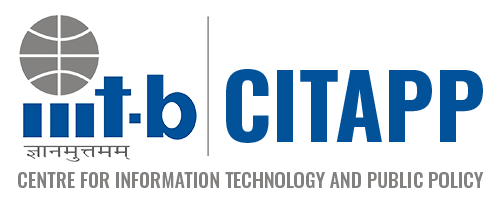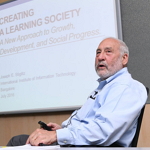Date: 5-7-2016
Description: Joseph Stiglitz of Columbia University delivered a public lecture at IIIT Bangalore on “Creating a Learning Society: A New Approach to Growth, Development, and Social Progress” on Tuesday, 5th July 2016. The talk was largely based on the arguments in the book written by Prof. Stiglitz along with Bruce Greenwald.
Lecture video: https://www.youtube.com/watch?v=EIyD5f8_Mf4
It has long been recognized that an improved standard of living results from advances in technology, not from the accumulation of capital. It has also become clear that what truly separates developed from less-developed countries is not just a gap in resources or output but a gap in knowledge. In fact, the pace at which developing countries grow is largely a function of the pace at which they close that gap. Thus, to understand how countries grow and develop, it is essential to know how they learn and become more productive and what government can do to promote learning. But the production of knowledge differs from that of other goods and market economies alone typically do not produce and transmit knowledge efficiently. Closing knowledge gaps and helping laggards learn are central to growth and development. But creating a learning society is equally crucial if we are to sustain improved living standards. Well-designed government trade and industrial policies can help create a learning society, and poorly designed intellectual property regimes can retard learning. While policy makers must realize that virtually every government policy has effects, both positive and negative, on learning, many standard policy prescriptions, especially those associated with “neoliberal” doctrines focusing on static resource allocations, impede learning. Among the provocative implications are that free trade may lead to stagnation whereas broad-based industrial protection and exchange rate interventions may bring benefits – not just to the industrial sector, but to the entire economy.
Prof. Joseph E. Stiglitz is University Professor at Columbia University, and a co-chair of the High-Level Expert Group on the Measurement of Economic Performance and Social Progress at the OECD. A recipient of the Nobel Memorial Prize in Economic Sciences (2001), he is also a former Senior Vice President and Chief Economist of the World Bank, and a former Chairman of the US President’s Council of Economic Advisers. In 2000, Prof. Stiglitz founded the Initiative for Policy Dialogue, a think tank on international development based at Columbia University. Based on academic citations, he is the 4th most influential economist in the world today and is known for his pioneering work on asymmetric information, income distribution, asset risk management, corporate governance, and international trade.

